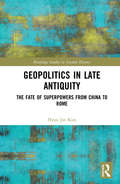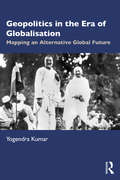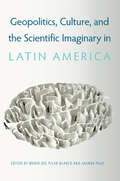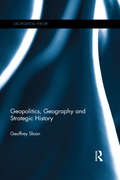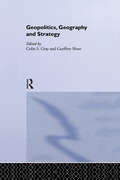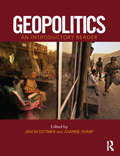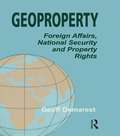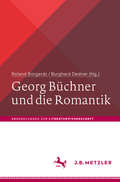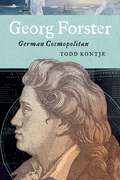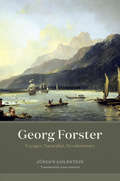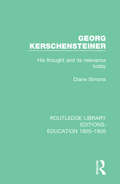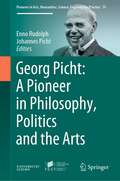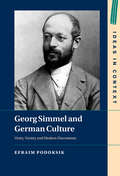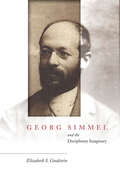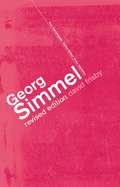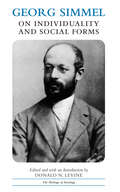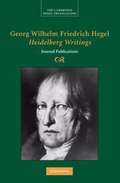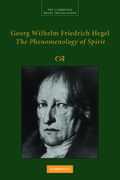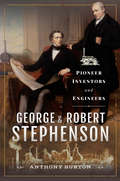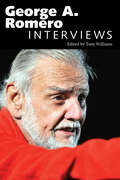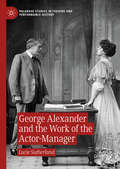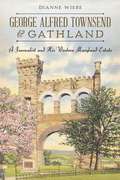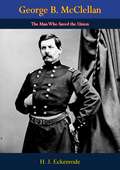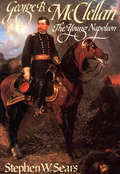- Table View
- List View
Geopolitics in Late Antiquity: The Fate of Superpowers from China to Rome (Routledge Studies in Ancient History)
by Hyun Jin KimGeopolitics in Late Antiquity explores the geopolitical revolution which shook the foundations of the ancient world, the dawning of the millennium of Inner Asian dominance and virtual monopoly of world power (with interludes) that began with the rise of the Huns and then continued under the hegemony of various other steppe peoples. Kim examines first the geopolitical situation created by the rise of Inner Asian powers, and then the reactions of the great empires of Eurasia to this geopolitical challenge. A unique feature of this book is its in-depth analysis of the geostrategies (some successful, others misguided) adopted by China, Rome and Persia to cope with the growing Inner Asian threat. The conclusions and insights drawn from this analysis are then used to inform modern geopolitics, mainly the contest for hegemonic power between the United States and China. Geopolitics in Late Antiquity is a crucial resource for both academic and learned general readership, who have an interest in the fate of antiquity’s superpowers and also for those engaged in current international relations policy-making, who wish to learn from historical precedents.
Geopolitics in the Era of Globalisation: Mapping an Alternative Global Future
by Yogendra KumarThis book presents an alternative roadmap for a world characterised by geopolitical uncertainty. The surging expectations about a future world of democratic values and high economic growth, born out of superpower bonhomie at the end of the Cold War, did not lead to the promised outcomes. Instead we are faced with deeply destabilising challenges, like climate change, widespread state fragility, terrorism, arms race, disruptive newer technologies, global economic volatility, and ineffectiveness of multilateral institutions, old and new. The volume: surveys the intellectual discourse, the attempts to redesign the global institutions, and the geopolitical trends since the end of the Cold War for an understanding of the contemporary geopolitics, analyses the characteristics of the contemporary geopolitics, the seeming intractability of the global challenges, and the ongoing discourse about preventing their further deterioration, foregrounds the Gandhian praxis and IR theory for managing power transitions anchored in non-violent mobilisation of empowered masses, ensuring institutional resilience, and illustrates them through ongoing conflicts in Iraq and Afghanistan, outlines an approach, based on the Gandhian experience of managing political change, towards conflict, geopolitical uncertainties, and institutional ineffectiveness for securing a better future globally, including South Asia. Accessibly written, this volume will be indispensable for foreign policy experts, government think tanks, and career bureaucrats. It will also be essential for scholars and researchers of international relations, foreign policy, politics, and governance and public policy.
Geopolitics, Culture, and the Scientific Imaginary in Latin America
by Joanna Page María del Pilar BlancoHighlighting the relationship among science, politics, and culture in Latin American history Challenging the common view that Latin America has lagged behind Europe and North America in the global history of science, this volume reveals that the region has long been a center for scientific innovation and imagination. It highlights the important relationship among science, politics, and culture in Latin American history.Scholars from a variety of fields including literature, sociology, and geography bring to light many of the cultural exchanges that have produced and spread scientific knowledge from the early colonial period to the present day. Among many topics, these essays describe ideas on health and anatomy in a medical text from sixteenth-century Mexico, how fossil discoveries in Patagonia inspired new interpretations of the South American landscape, and how Argentinian physicist Rolando García influenced climate change research and the field of epistemology. Through its interdisciplinary approach, Geopolitics, Culture, and the Scientific Imaginary in Latin America shows that such scientific advancements fueled a series of visionary utopian projects throughout the region, as countries grappling with the legacy of colonialism sought to modernize and to build national and regional identities.
Geopolitics, Geography and Strategic History (Geopolitical Theory)
by Geoffrey SloanThis volume examines geopolitics by looking at the interaction between geography, strategy and history. This book addresses three interrelated questions: why does the geographical scope of political objectives and subsequent strategy of states change? How do these changes occur? Over what period of time do these changes occur? The theories of Sir Halford Mackinder and Nicholas Spykman are examined in order to provide an analytical narrative for five case studies, four historical and one contemporary. Taken together they offer the prospect of converting descriptions of historical change into analytic explanations, thereby highlighting the importance of a number of commonly overlooked variables. In addition, the case studies will illuminate the challenges that states face when attempting to change the scope of their foreign policy and geo-strategy in response to shifts in the geopolitical reality. This book breaks new ground in seeking to provide a way to understand why and how the geographical scope of political objectives and subsequent strategy both expands and contracts. This book will be of much interest to students of geopolitics, strategic studies, military history, and international relations.
Geopolitics, Geography and Strategy
by Colin S. Gray Geoffrey SloanGeopolitical conditions influence all strategic behaviour - even when cooperation among different kinds of military power is expected as the norm, action has to be planned and executed in specific physical environments. The geographical world cannot be avoided, and it happens to be 'organized' into land, sea, air and space - and possibly the electromagnetic spectrum including 'cyberspace'. Although the meaning of geography for strategy is a perpetual historical theme, explicit theory on the subject is only one hundred years old. Ideas about the implication of geographical, especially spatial, relationships for political power - which is to say 'geopolitics'- flourished early in the twentieth century.Divided into theory and practice sections, this volume covers the big names such as Mackinder, Mahan and Haushofer, as well as looking back at the vital influence of weather and geography on naval power in the long age of sail (sixteenth to nineteenth centuries). It also looks forward to the consequences of the revival of geopolitics in post-Soviet Russia and the new space-based field of "astropolitics".
Geopolitics: An Introductory Reader (Critical Geopolitics)
by Jason Dittmer Jo SharpIt has been increasingly impossible to think about our changing world without coming across the term 'geopolitics'. In the wake of the invasion and occupation of Iraq by the United States, United Kingdom, and others, geopolitics has been offered as an explanation for the occupation's failure to reinvent the Iraqi state and as a blueprint for future action. But what is 'geopolitics'? Drawing both on academic and political material, this book introduces readers to the concept of geopolitics, from the first usage of the term to its more recent reconceptualisations. The concept of geopolitics is introduced through four thematic sections - Imperial Geopolitics, Cold War Geopolitics, Geopolitics after the Cold War and Reconceptualising Geopolitics. Each section includes key writings from a range of diverse and leading authors such as Said, Agnew, Dalby, O Tuathail, Gregory, Barnett and Kaplan, and is accompanied by a critical introduction by the editors to guide the reader through the material. This Reader establishes the foundations of geopolitics while also introducing readers to the continuing significance of the concept in the 21st century. This Reader provides an essential resource that exposes students to original writing. The Editors provide a pathway through the material with Section Introductions to assist the readers understanding of the context of the material and impacts of the writings. The readings included draw from a range of authors, writing from a range of locations. The Reader concludes with the latest changes in geopolitical thought, incorporating feminist and other perspectives.
Geoproperty: Foreign Affairs, National Security and Property Rights
by Geoff DemarestSome innovations create new strategic property and new conflicts. Demarest argues that we have not reached the end of history and modern man will continue to fight over property as before, but the property will be of a post-modern character, such as electronic wavelengths and genetic codes.
Georg Büchner und die Romantik (Abhandlungen zur Literaturwissenschaft)
by Roland Borgards Burghard DednerIn seiner Auseinandersetzung mit der Romantik verfolgt Büchner ein doppeltes Projekt: die Romantik modern zu machen und das Moderne der Romantik zu erkennen. Damit reagiert Büchner auf eine Ambivalenz, die schon in der romantischen Literatur selbst angelegt ist, eine Ambivalenz zwischen blauer Blume und schwarzer Nacht, zwischen gläubigem Gottvertrauen und wahnsinnigem Identitätsverlust, zwischen schöner Form und grotesker Gestalt. Der Band untersucht diese Zusammenhänge mit Blick auf einzelne Autoren, spezifische ästhetische Verfahren und einschlägige Themen.
Georg Forster: German Cosmopolitan (Max Kade Research Institute)
by Todd KontjeGeorg Forster (1754–1794) was famous during his lifetime, notorious after his death, and largely forgotten by the later nineteenth century. Remembered today as the young man who sailed around the world with Captain Cook and as one of the leading figures in the revolutionary Republic of Mainz, Forster was also a prolific writer and translator who left behind two travelogues, a series of essays on diverse topics, and numerous letters. This in-depth look at Forster’s work and life reveals his importance for other writers of the age. Todd Kontje traces the major intellectual themes and challenges found in Forster’s writings, interweaving close textual analysis with his rich but short life. Each chapter engages with themes that reflect the current debates in eighteenth-century literary and cultural studies, including changing notions of authorship, multilingualism, the representation of so-called primitive societies, Enlightenment ideas about race, and early forms of ecological thinking. As Kontje shows, Forster’s peripatetic life, malleable sense of national identity, and fluency in multiple languages contrast with the image of the solitary genius in the “age of Goethe.” In this way, Forster provides a different model of authorship and citizenship better understood in the context of an increasingly globalized world.Compellingly argued and engagingly written, this book restores Forster to his rightful place within the German literary tradition, and in so doing, it urges us to reconsider the age of Goethe as multilingual and malleable, local and cosmopolitan, dynamic and decentered. It will be welcomed by specialists in German studies and the Enlightenment.
Georg Forster: Voyager, Naturalist, Revolutionary
by Jürgen Goldstein“Marvelous. . . . Wonderfully imaginative. . . . Sparkling.”—Wall Street Journal “Stunning. . . . Read this book: in equal measure it will give you hope and trouble your dreams.”—Laura Dassow Walls, author of Henry David Thoreau: A Life and Passage to Cosmos: Alexander von Humboldt’s Shaping of America Georg Forster (1754–94) was in many ways self-taught and rarely had two cents to rub together, but he became one of the most dynamic figures of the Enlightenment: a brilliant writer, naturalist, explorer, illustrator, translator—and a revolutionary. Granted the extraordinary opportunity to sail around the world as part of Captain James Cook’s fabled crew, Forster touched icebergs, walked the beaches of Tahiti, visited far-flung foreign nations, lived with purported cannibals, and crossed oceans and the equator. Forster recounted the journey in his 1777 book A Voyage Round the World, a work of travel and science that not only established Forster as one of the most accomplished stylists of the time—and led some to credit him as the inventor of the literary travel narrative—but also influenced other German trailblazers of scientific and literary writing, most notably Alexander von Humboldt. A superb essayist, Forster made lasting contributions to our scientific—and especially botanical and ornithological—knowledge of the South Seas. Having witnessed more egalitarian societies in the southern hemisphere, Forster returned after more than three years at sea to a monarchist Europe entering the era of revolution. When, following the French Revolution of 1789, French forces occupied the German city of Mainz, Forster became a leading political actor in the founding of the Republic of Mainz—the first democratic state on German soil. In an age of Kantian reason, Forster privileged experience. He claimed a deep connection between nature and reason, nature and politics, nature and revolution. His politics was radical in its understanding of revolution as a natural phenomenon, and in this often overlooked way his many facets—as voyager, naturalist, and revolutionary—were intertwined. Yet, in the constellation of the Enlightenment’s trailblazing naturalists, scientists, political thinkers, and writers, Forster’s star remains relatively dim today: the Republic of Mainz was crushed, and Forster died in exile in Paris. This book is the source of illumination that Forster’s journey so greatly deserves. Tracing the arc of this unheralded polymath’s short life, Georg Forster explores both his contributions to literature and science and the enduring relationship between nature and politics that threaded through his extraordinary four decades.
Georg Kerschensteiner: His Thought and its Relevance Today (Routledge Library Editions: Education 1800-1926 #14)
by Diane SimonsThis book, first published in 1966, is an introduction to the life and work of Georg Kerschensteiner, the pioneer of the modern German system of vocational education, a system which is largely responsible for Germany’s remarkable industrial recovery and advancement after the Second World War. This title will be of interest to students of education and history.
Georg Picht: A Pioneer in Philosophy, Politics and the Arts (Pioneers in Arts, Humanities, Science, Engineering, Practice #19)
by Johannes Picht Enno RudolphAimed at an international readership, this book offers a representative collection of essays by the German philosopher, Georg Picht (1913-1982), who was a specialist in Greek philosophy, practical philosophy and philosophy of religion. Picht's themes address different disciplines, such as ancient philosophy, systematic philosophy and political analysis, and often contain critical statements on significant developments from the European Enlightenment to the Cold War era. Other essays offer a distinctive interdisciplinary approach characteristic of the author. These contributions are relevant to both philosophy and science as they discuss, for instance, philosophical definitions of space and time or the relationship between history and evolution. Another part of the book includes texts on art that present Picht’s authentic definition of art and his theory of the interdependence of art and politics.• For the first time, key texts of the German philosopher and political thinker Georg Picht are presented to a global readership in English.• Like Nietzsche’s philosophy, Picht’s work is grounded in his outstanding professionalism in the different fields of classics, embracing not only textsand theories of the great thinkers from the pre-Socratic to the post-Aristotelian and Stoic philosophies but also the main currents of ancient literature.• Picht’s importance as a political author and public adviser is exceptional, and may explain why his lifelong friend Carl Friedrich von Weizsäcker – another pioneer presented in this series – called him his “teacher”.
Georg Simmel and German Culture: Unity, Variety and Modern Discontents (Ideas in Context #135)
by Efraim PodoksikThe significance of the German philosopher and social thinker, Georg Simmel (1858–1918), is only now being recognised by intellectual historians. Through penetrating readings of Simmel's thought, taken as a series of reflections on the essence of modernity and modern civilisation, Efraim Podoksik places his ideas within the context of intellectual life in Germany, and especially Berlin, under the Kaiserreich. Modernity, characterised by the growing differentiation and fragmentation of culture and society, was a fundamental issue during Simmel's life, underpinning central intellectual debates in Imperial Germany. Simmel's thought is depicted here as an attempt at transforming the complexity of these debates into a coherent worldview that can serve as an effective guide to understanding their main parameters. Paying particular attention to the genealogy and usage of the concepts of Bildung, culture and civilisation in Germany, this study offers contextual analyses of Simmel's philosophies of culture, society, art, religion and the feminine, as well as his interpretations of Dante, Kant, Nietzsche, Schopenhauer, Goethe and Rembrandt.
Georg Simmel and the Disciplinary Imaginary
by Elizabeth GoodsteinAn internationally famous philosopher and best-selling author during his lifetime, Georg Simmel has been marginalized in contemporary intellectual and cultural history. This neglect belies his pathbreaking role in revealing the theoretical significance of phenomena—including money, gender, urban life, and technology—that subsequently became established arenas of inquiry in cultural theory. It further ignores his philosophical impact on thinkers as diverse as Benjamin, Musil, and Heidegger. Integrating intellectual biography, philosophical interpretation, and a critical examination of the history of academic disciplines, this book restores Simmel to his rightful place as a major figure and challenges the frameworks through which his contributions to modern thought have been at once remembered and forgotten.
Georg Simmel: Critical Assessments (Key Sociologists)
by David FrisbyUntil recently little of Simmel's work was available in translation and certain key texts were unknown outside Germany. David Frisby, the eminent Simmel scholar, provides not only an introduction to the major sociological writings of this important figure, but also an argument for a reconsideration of his work. The author outlines the cultural and historical context in which Simmel worked; reviews Simmel's most important writings; and examines his legacy to sociology by illuminating his links with Weber's theories and his influential relationship with Marxism.Simmel, a central figure in the development of modern sociology, and a contemporary of Weber and Durkheim, was one of the first to identify sociology as a separate discipline. His ideas influenced Weber, the Chicago School, and many later sociologists. His introduction of a number of basic concepts to sociology, such as exchange, interaction and differentiation, attest to his intellectual stature and the far-reaching significance of his work.
Georg Simmel: On Individuality and Social Forms
by Georg Simmel Donald N. Levine"Of those who created the intellectual capital used to launch the enterprise of professional sociology, Georg Simmel was perhaps the most original and fecund. In search of a subject matter for sociology that would distinguish it from all other social sciences and humanistic disciplines, he charted a new field for discovery and proceeded to explore a world of novel topics in works that have guided and anticipated the thinking of generations of sociologists. Such distinctive concepts of contemporary sociology as social distance, marginality, urbanism as a way of life, role-playing, social behavior as exchange, conflict as an integrating process, dyadic encounter, circular interaction, reference groups as perspectives, and sociological ambivalence embody ideas which Simmel adumbrated more than six decades ago. "—Donald N. Levine Half of the material included in this edition of Simmel's writings represents new translations. This includes Simmel's important, lengthy, and previously untranslated "Group Expansion and Development of Individuality," as well as three selections from his most neglected work, Philosophy of Money; in addition, the introduction to Probleme der Geschichtsphilosophie, chapter one of the Lebensanschauung, and three essays are translated for the first time.
Georg Wilhelm Friedrich Hegel: Journal Publications
by Brady Bowman Allen SpeightThis work brings together, for the first time in English translation, Hegel's journal publications from his years in Heidelberg (1816-18), writings which have been previously either untranslated or only partially translated into English. The Heidelberg years marked Hegel's return to university teaching and represented an important transition in his life and thought. The translated texts include his important reassessment of the works of the philosopher F. H. Jacobi, whose engagement with Spinozism, especially, was of decisive significance for the philosophical development of German Idealism. They also include his most influential writing about contemporary political events, his essay on the constitutional assembly in his native Württemberg, which was written against the background of the dramatic political and social changes occurring in post-Napoleonic Germany. The translators have provided an introduction and notes that offer a scholarly commentary on the philosophical and political background of Hegel's Heidelberg writings.
Georg Wilhelm Friedrich Hegel: The Phenomenology of Spirit (Cambridge Hegel Translations)
by Michael Baur Georg Wilhelm Friedrich Hegel Terry PinkardHegel's Phenomenology of Spirit (1807) is one of the most influential texts in the history of modern philosophy. In it, Hegel proposed an arresting and novel picture of the relation of mind to world and of people to each other. Like Kant before him, Hegel offered up a systematic account of the nature of knowledge, the influence of society and history on claims to knowledge, and the social character of human agency itself. A bold new understanding of what, after Hegel, came to be called 'subjectivity' arose from this work, and it was instrumental in the formation of later philosophies, such as existentialism, Marxism, and American pragmatism, each of which reacted to Hegel's radical claims in different ways. This edition offers a new translation, an introduction, and glossaries to assist readers' understanding of this central text, and will be essential for scholars and students of Hegel.
George & Robert Stephenson: Pioneer Inventors and Engineers
by Anthony BurtonA dual biography of the father and son railroad engineers who revolutionized Victorian transportation and reshaped modern British life.Engineer and inventor George Stephenson is known as the Father of Railways. Together with his son Robert, he built the first steam locomotive to carry passengers on a public line. They also developed much of Britain’s early railway map. In George and Robert Stephenson, industrial historian Anthony Burton examines the lives of these two giants of the late Georgian and early Victorian ages.With new research, Burton offers a fresh look at the achievements of Robert Stephenson and Company Limited, the first engineering firm devoted to railway engines. Above all, he underscores the ability of both men to overcome some of the most pressing engineering problems of their time.
George A. Romero: Interviews (Conversations with Filmmakers Series)
by Tony WilliamsGeorge A. Romero (b. 1940) has achieved a surprising longevity as director since his first film, Night of the Living Dead (1968). After relocating to Canada, he shows no signs of slowing up: his recent film, Survival of the Dead (2009), is discussed in a new interview conducted by Tony Williams for this volume, and still other films are awaiting release. Although commonly known as a director of zombie films, a genre he himself launched, Romero's films often transcend easy labels. His films are best understood as allegorical commentaries on American life that just happen to appropriate horror as a convenient vehicle. Romero's films encompass works as different as The Crazies, Hungry Wives, Knightriders, and Bruiser. The interviews in this collection cover a period of over forty years. In whatever format they originally appeared—the printed page, the internet, or the video interview—these discussions illustrate both the evolution of Romero's chosen forms of technology and the development of his thinking about the relationship between cinema and society. They present Romero as an independent director in every sense of the word.
George Alexander and the Work of the Actor-Manager (Palgrave Studies in Theatre and Performance History)
by Lucie SutherlandIn the first book-length study of the work and legacy of West End actor-manager George Alexander since the 1930s, George Alexander and the Work of the Actor Manager examines the key part this figure played in presenting new drama by authors including Oscar Wilde and Henry James. The book sheds new light on the figure of the actor-manager, assessing in detail the influence of Alexander within and beyond his time.At the St. James’s Theatre in London between 1891 and 1918, through a range of strategies including the support of new writers, and adaptation of fiction to the stage, Alexander sustained professional status through practices that continue to be reflected in the cultural industries today. A range of evidence is employed including production reviews, anecdotal accounts, financial records, and personal correspondence, to reveal how he operated as a business entrepreneur as well as an artistic innovator.
George Alfred Townsend and Gathland: A Journalist and His Western Maryland Estate
by Dianne WiebeThe youngest correspondent to cover the Civil War and a pioneer in newspaper syndication, George Alfred Townsend came from modest circumstances. Using the pen name of GATH, he rose to fame and fortune after the war, and his career brought him into contact with sitting presidents and luminaries such as Mark Twain. Though almost forgotten today in the canon of Maryland authors, GATH left a lasting legacy of literature and a most unique monument. He created a lavish summer estate near Boonsboro, Maryland, named Gapland--now called Gathland. He also famously erected the War Correspondents Memorial Arch, a monument to fellow wartime journalists. Today, GATH's estate is preserved and interpreted by a state park and its museums. His commanding arch remains a bold reminder of the creative genius of George Alfred Townsend.
George B. McClellan: The Man Who Saved the Union
by H. J. Eckenrode Bryan ConradTHIS IS MORE THAN THE STORY OF “Little Mac.” It is the story also of that dark center of intrigue, the nation’s capital in 1862—of Washington shaking in its shoes for fear of an invasion by “gaunt hairy beings riding into Washington like Centaurs and perhaps setting fire to the Capitol”; a Washington dominated by politicians and partisans, where party strife and bitterness were so strong that some members of the government itself preferred Union defeat to a victory which might make a Democrat (McClellan) a national hero and a presidential possibility; a Washington in which even the President and his Cabinet showed a childish impatience because McClellan did not remove the threat to the capital overnight—in spite of a liquid terrain and “the greatest military combination in modern history, Lee and Jackson”; a Washington rotten with military gossip and spy-talk in back alleys….“THIS BOOK ORIGINATED in studies made by the historians of the Conservation Commission in the Richmond battlefield area, which is comprised in the Richmond Battlefield Park, a charge of the commission. These battlefields are the best preserved and least studied (because long inaccessible) in the country. A detailed examination of the terrain convinced the historians, both of them Southerners, that McClellan was a great general and that he has been underestimated by historians. Their opinion was confirmed by a study of the records. They came to the conclusion that it was McClellan who prevented the defeat of the North in 1861-62 when the Confederacy was relatively stronger than it was at a later time. Believing that politics should not be permitted to influence military judgments, they have written this book, partly for the purpose of doing justice to a great man who has suffered at the hands of history. It is based on the ground itself and the original sources, and is believed to be a contribution to American and Virginia history.”—Foreword
George B. McClellan: The Young Napoleon (Quality Paperbacks Ser.)
by Stephen W. Sears&“Sears has finally unraveled the mystique of this complex, brilliant Civil War general . . . A fascinating story&” (James M. McPherson, author of Battle Cry of Freedom). &“Commander of the Northern army in the Civil War, Gen. George McClellan saw himself as God&’s chosen instrument for saving the Union. Self-aggrandizing, with a streak of arrogant stubbornness, he set himself above President Lincoln, whom he privately called &‘the Gorilla.&’ To &‘the young Napoleon,&’ as McClellan&’s troops dubbed him, abolition was an &‘accursed doctrine.&’ Fond of conspiracy plots, he insisted that the Lincoln administration had traitorously conspired to set him up for military defeat. Although he constantly anticipated one big, decisive battle that would crush the South, he squandered one military opportunity after another, and, if Sears is correct, he was the worst strategist the Army of the Potomac ever had. Based on primary sources, letters, dispatch books, diaries, newspapers, this masterly biography is an astonishing portrait of an egotistical crank who could snatch defeat from the jaws of victory.&” —Publishers Weekly &“Engagingly written and thoroughly researched, Sears&’s persuasive critique is the best and most complete biography of this controversial general.&” —Library Journal &“The best biography of McClellan ever published. Sears uses intensive research, including new material, to document the tormented, wasted military career of a talented man . . . The enigma of McClellan has never been explained so well . . . Historians should be grateful.&” —The Washington Post Book World
